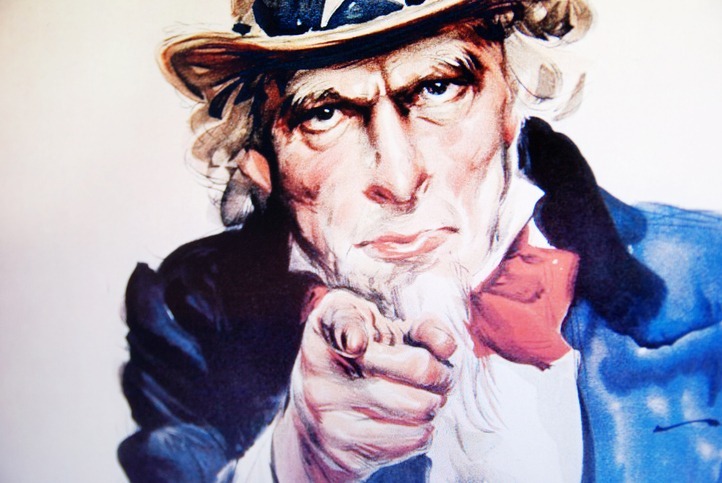‘I Want You’—How Uncle Sam helped invent public relations
A comms expert shares the fascinating, checkered backstory of how modern PR evolved—and which timeless tactics of persuasion still hold true more than 100 years later.

While it only lasted for a year and half, the Committee on Public Information was the first official propaganda machine in the United States. The CPI sold and financed a war, framed the Spanish flu pandemic, and helped birth the field of modern public relations.
As the United States entered the First World War in 1917, President Woodrow Wilson established the Committee on Public Information to shape public opinion on the danger of German militarism and the need for a global response. Essentially, the U.S. needed to sell Americans on why it should be in a war at all, and to raise money to pay for it.
Wilson installed George Creel as the first head of the CPI. A hard-driving, progressive journalist from Denver who cut his teeth at the Rocky Mountain News, Creel famously observed, “People do not live by bread alone: They live mostly by catch phrases.”
Creel hired some of the best and brightest from around the country — academics, advertisers, journalists — and brought them to Washington D.C. for what would become the official messaging machine of the United States.
The CPI was organized into five divisions. The Speaking Division recruited the “Four-Minute Man” to give brief speeches at civic organizations, such as the Rotary Club. Seventy-five thousand people across America received talking points and bulletins about why people should support the war.
The Film Division made short films for theaters, to be shown before main attractions as part of a film program. These short films almost invariably championed the superiority of American soldiers and the heroism of the Allies in their fight against the barbarous Germans. (Some of these are hilarious.)
The Foreign Language Newspaper Division monitored and influenced the hundreds of newspapers in languages other than English published in the U.S.
The War Bond Division was charged with promoting and financing the war effort by encouraging Americans to buy bonds. They hyped investment in U.S. bonds as an act of patriotism for the greater good — not just for U.S. interests, but for the freedom of the entire world against the forces of evil.
The Division of Pictorial Publicity produced iconic imagery to motivate citizens to support the war by appealing to a sense of civic duty and pride. This division produced the legendary Uncle Sam poster, “I want you.”
The CPI only lasted 18 months, but it would have a profound and lasting impact on how Americans viewed themselves. It reinforced a sense of national identity and collective purpose. Despite its best intentions, however, it also left behind a legacy of xenophobia and jingoism—a fear of the other.
Before long, the CPI would expand into other realms of public policy. During the 1918 influenza epidemic it actively suppressed information about the real harm of the virus and forbade newspapers from criticizing the government’s handling of the crisis; they didn’t want the enemy to perceive those American forces were sick or weak.
For our purposes, the CPI may be most important government committee because it was the womb from which the field of public relations was born.
Edward Bernays, nephew of Sigmund Freud, set up the first public relations shop in 1919 following his time at the CPI, and he was the first to use the term. Bernays was an optimist who believed that techniques for influencing public opinion could be used to better society.
He considered a press man and a counsel on public relations two distinct types of roles: A press man is a liaison to the media and is always trying to get free coverage. A PR counsel creates news. Bernays set out to frame public relations as a highly respectable profession with a history rooted in social sciences and psychiatry. He contended that the interests of a complex society—governments, corporations, non-profits, labor unions, and organizations all trying to gain an advantage—called for expert advice in how to communicate effectively.
His first book, “Crystallizing Public Opinion,” published in 1923, followed on the heels of his mentor Walter Lippmann’s “Public Opinion.” In 1928 Bernays published his second book, “Propaganda,” with the opener: “The conscious and intelligent manipulation of the organized habits and opinions of the masses is an important element in democratic society.” Those opinion-makers are “an invisible government which is the true ruling power of our country.” As a result, “we are governed, our minds molded, our tastes formed, our ideas suggested, largely by men we have never heard of.”
Bernays knew what he was talking about. He was one of those men.
When Bernays died in 1995, he was described in his obituary as “the father of public relations.” He was later named by Life magazine as one of the 100 most influential Americans of the 20th century. Bernays argued for a strict ethical code for the public relations profession and that the needs of society as a whole come before those of any individual. He advised clients on their complete relationship to their environment and distinguished himself from advertisers and marketers, whom he portrayed as pleading with people to purchase a certain commodity.
Bernays recognized the “dark forces from below” and argued that “the duty of the higher strata [is to] inject moral and spiritual motives into public opinion.” He stated plainly: “Public opinion must become public conscience.”
In an influential 1947 article, “The Engineering of Consent,” Bernays applies the military metaphor, tactics, to the strategy of public relations. In writing about tactics, he encouraged the use of public spectacles to create news because these events could be communicated to “infinitely more people than those actually participating, and such events vividly dramatize ideas for those who do not witness the events.”
Bernays knew how to create a stunt. In 1929, he followed his own advice promoting the American Tobacco Company in New York City’s Easter Parade when he orchestrated ten debutantes on a float to light cigarettes simultaneously. By undermining the taboo against women smoking in public, he fed into the rising feminism of the age. The cigarettes became “Torches of Freedom.”
The CPI was an interesting and influential effort. While controversial, one of its products, Edward Bernays, left the legacy that people and groups had a right to promote their ideas. Indeed, it was a duty and responsibility. He thought the competition of ideas was healthy for both democracy and capitalism.
The alternative is that people are not allowed to express ideas openly and that there is no marketplace for the currency of communication, which inevitably looks like fascism and totalitarianism. This is why Uncle Sam proclaimed simply and sternly, “I Want You for the U.S. Army.”
Matthew L. Moseley is the president and founder of the Ignition Strategy Group and the author of Ignition: Superior Communication Strategies to Create Stronger Connections. He is a world record adventure swimmer and lives in Boulder, Colorado. Learn more at https://www.matthewlmoseley.net/







It’s an interesting piece, but I struggle with the characterization.
As a taxpayer, I’m not too keen on paying for an office to persuade people one way or another.
As a veteran, and history buff, the world was in fact facing an existential threat. The Germans went on to start two world wars in the span of 50 years. Convincing the American public of the need to get involved was, in my assessment, a necessary step.
I’d go a step further and argue we are in a similar spot today.
1. COVID is in fact a war and the CDC has bungled the message and delivery over and over again. They need some dedicated help.
2. We’ve completely wasted 20 years of sweat, blood and treasure in Afghanistan. It’s a fiasco, and we allowed the very threat we went to eliminate in the beginning to regain power. Why did we withdraw? Because no one convinced the American people of its necessity.
I think the chances are pretty good we’ll be forced to return there one day. Should that happen, then perhaps a little persuasion at the right moment in history might have been tax money well spent.